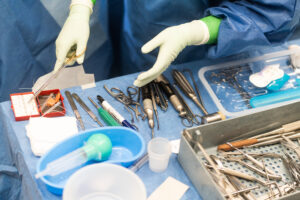1200 North 7th Street, Chariton, Iowa 50049
Phone: (641) 774-3349 | Toll-free: (800) 404-3111 | Email: acurry@lchcia.com
Services offered:
- Abdominal surgery
- Appendectomy
- Benign breast issues
- Breast cancer
- Colonoscopy
- Critical care consults
- EGD
- Gallbladder
- GERD
- Gynecology
- Hernia
- Sentinel Lymph Node Biopsy
- Skin cancers
- Thermal Ablation
- Total Knee Replacement
Preparing for Surgery
 Thinking about an upcoming surgery can prompt many questions. Here is some basic information about how to prepare for your surgery and what to expect when you arrive at LCHC for your surgery. Before having surgery at LCHC, you must have a medical history/physical within thirty (30) days of your surgery. You may also need lab tests. This will be determined by your physician and/or surgeon.
Thinking about an upcoming surgery can prompt many questions. Here is some basic information about how to prepare for your surgery and what to expect when you arrive at LCHC for your surgery. Before having surgery at LCHC, you must have a medical history/physical within thirty (30) days of your surgery. You may also need lab tests. This will be determined by your physician and/or surgeon.
At LCHC, our surgical services team provides a wide range of services close to home. Partnering with general and specialty surgeons, we are able to offer emergency surgery as well as a wide range of procedures from podiatry and orthopaedic surgery to cataract surgery and colonoscopy screenings in our state-of-the-art surgical facility. Whether you are having surgery that requires an inpatient stay in the hospital, or outpatient surgery, our surgical staff will offer exceptional care before, during, and after your surgery.
Anesthesia
Along with general anesthesia for surgeries, LCHC also offers other anesthesia services:
- Epidural Steroid Injections
- Peripheral Nerve Blocks
- PICC Lines
Appendectomy
An appendectomy is the only treatment for appendicitis – inflammation of the appendix. Once diagnosed with appendicitis, the appendix should be removed prior to it rupturing and then spreading the infection to the abdomen. If the appendix has already ruptured, surgery is still performed and is more complex. An appendectomy may be performed either traditionally – with a large incision, or by laparascopy – consisting of three to four small cuts with the use of a scope.
Symptoms of appendicitis include:
- Pain near the belly or upper abdomen that sharpens and moves to the lower right abdomen
- Loss of appetite
- Nausea and/or vomiting
- Abdominal swelling
- Fever
- Painful urination
- Severe cramps
- Constipation or diarrhea with gas
Colonoscopy
The observation of the lower digestive system – the large intestine. This procedure, a direct exam of the colon, can help diagnose early cancers, tumors, polyps, abscesses, and inflammation. Colonoscopy can usually assist with the diagnosis of reasons for pain, anemia, or rectal bleeding. Polyps, which may lead to colon cancer, can be removed and tissue can be collected for further study. Colorectal cancer, which is the only truly preventable cancer, may be prevented through the removal of polyps.
Your physician may order a colonoscopy if you are exhibiting any of the following warning signs of gastrointestinal disease:
- Abdominal tenderness, pain or rigidity, epigastric pain
- Change in bowel habits, such as constipation, caliber of stools, or chronic diarrhea
- Persistent vomiting or diarrhea
- Rectal bleeding
- Weight loss
- Dehydration or fever
- Heartburn
- Iron-deficiency anemia
EGD
Esophagogastroduodenoscopy (EGD) is a scope examination that visualizes the stomach and part of the small intestine. EGD Can help diagnose ulcers, gastritis, tumors, polyps, cancers, and lesions. It can also gather specimens for further study.
Your physician may order an EGD if you are exhibiting any of the following warning signs of gastrointestinal disease:
- Difficulty swallowing
- Abdominal tenderness, pain or rigidity; epigastric pain
- Change in bowel habits, such as constipation, caliber of stools, or chronic diarrhea
- Persistent vomiting or diarrhea
- Rectal bleeding
- Weight loss
- Dehydration or fever
- Heartburn
- Iron-deficiency anemia
- Full feeling after eating
ENT
We are proud to partner with Iowa ENT to offer high-quality ear, nose, and throat surgical procedures close to home.
Some of the ENT surgeries offered at Lucas County Health Center include:
- Myringotomy – relieves pressure in the eardrum from fluid buildup
- Myringoplasty – closes a perforation in the eardrum
- Tonsil and adenoid removal
- Nasal fracture
- Nasal endoscopy
Gallbladder
The gallbladder is a pear shaped organ that sits just under the liver. It’s main function is to store bile, which is produced by the liver. At times, surgical removal of the gallbladder is necessary to treat various conditions.
- Gallstones (cholelithiasis): causes pain, nausea, and inflammation. Gallstones are a common occurance.
- Cholecystitis: Inflammation of the gallbladder, usually due to a gallstone. Cholecystitis can cause severe pain, fever, and may require surgery.
- Gallstone pancreatitis: When a gallstone becomes impacted and blocks the ducts that drain the pancrease which causes inflammation of the pancreas. This is a serious condition that requires medical intervention.
GERD
Gastroesophageal reflux disease (GERD) occurs when the contents of the stomach, acid or occasionally bile, flows back into the esophagus. The acid or bile irritates the esophagus’ lining and causes GERD symptoms. Over time, the inflammation to the esophagus can lead to other complications including the narrowing of the esophagus, esophageal ulcer, and Barrett’s esophagus (precancerous changes to the esophagus). Medications may be used to treat GERD, however, surgical intervention is sometimes needed.
Initially, an endoscopy may be performed. This is a surgical procedure where a flexible tube, equipped with a camera and light, is led through the throat and allows visual examination of the esophagus. A biopsy may be collected during the procedure for further testing.
If medications do help, or you wish to avoid long-term medication use, other surgery is available to reinforce the lower esophageal sphincter, create a barrier, or form scar tissue to prevent reflux.
Gynecological
If medicine, lifestyle changes, and other treatments aren’t working, your provider may recommend surgery. Our team offers minimally invasive treatments that result in smaller incisions, less pain, fewer complications, and quicker recoveries. Gynecological surgery procedures offered at LCHC include hysterectomy (removal of the uterus), tubal ligation, removal of tubes and ovaries, and more.
Services include:
- Diagnostic laparascopy
- Tubal ligation
- Removal of tubes and ovaries
- Ablation
- Dilation and curettage (D&C)
- Thermal ablation
Orthopaedic
We are proud to partner with Dr. Ian Lin from DMOS Orthopaedic Centers to provide extensive orthopaedic services to our patients. Dr. Lin has more than 25 years of experience treating a wide variety of conditions for patients of all ages.
Orthopaedic surgical services include:
- Shoulder arthroscopy
- Knee arthroscopy
- Carpal and cubital tunnel release
- Total knee replacement
Podiatry
Dr. Eric Muhm, Podiatrist, specializes in the diagnosis and treatment of abnormal conditions of the ankle and foot. If your foot or ankle issue is not responding to conservative treatments, Dr. Muhm can help you determine if surgical intervention can alleviate discomfort or restore foot/ankle function.
Examples of surgical procedures include:
- Bunions
- Hammertoes
- Fracture care
- Sports injuries
- Flat feet
- Neuromas
- Soft tissue masses
Urology
Urologic surgery refers to any surgery as it pertains to any surgery that affects reproduction and urinary problems. This can be surgery on the ureter, bladder, kidneys, or genital areas. Urologic procedures can often be done on a laparoscopic level and may not require open surgery. However, if surgery is required, it is often minimally invasive.
Examples of urologic surgeries include:
- Impotence/erectile dysfunction
- Enlarged prostate
- Bladder diseases and conditions, including infections, benign and malignant
- Kidney infection
- Kidney or bladder stones
- Urinary incontinence

